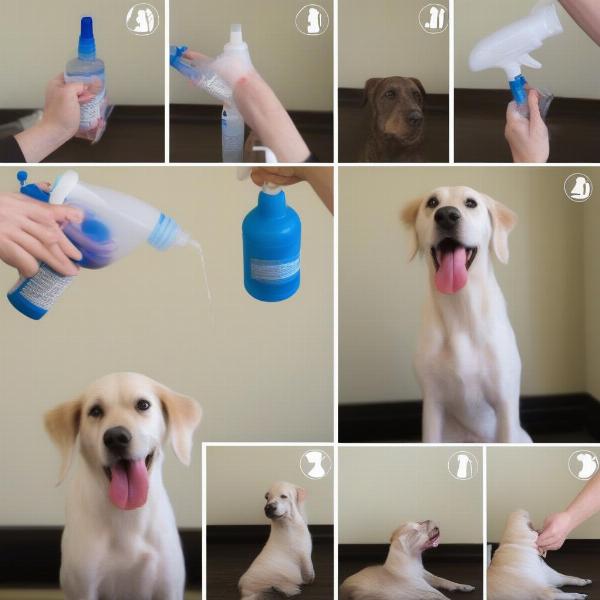Antibiotic spray for dogs is a convenient and often effective way to treat minor skin infections and wounds. Understanding when and how to use these sprays is crucial for responsible pet ownership. This guide will cover everything you need to know about antibiotic sprays for dogs, from choosing the right product to proper application and potential side effects.
Choosing the Right Antibiotic Spray for Your Dog
Selecting the appropriate antibiotic spray depends on the type and severity of your dog’s skin condition. Some sprays contain broad-spectrum antibiotics effective against a wide range of bacteria, while others target specific types of infections. Always consult your veterinarian before using any over-the-counter antibiotic spray on your dog. They can accurately diagnose the issue and recommend the most suitable product. Some common ingredients found in antibiotic sprays include bacitracin, neomycin, and polymyxin B.
Understanding Different Types of Skin Infections
Bacterial skin infections in dogs can manifest in various ways, from hot spots and itchy rashes to open sores and abscesses. Identifying the specific type of infection is key to effective treatment. Your veterinarian can perform necessary tests to determine the underlying cause of the infection and recommend the appropriate course of action.
Applying Antibiotic Spray Correctly
Proper application is crucial for maximizing the effectiveness of the antibiotic spray. First, clean the affected area with a gentle antiseptic solution. Then, hold the spray bottle a few inches away from your dog’s skin and apply a thin, even layer.  Applying antibiotic spray correctly on a dog Avoid spraying directly into your dog’s eyes, nose, or mouth. Always follow the instructions provided by your veterinarian and on the product label.
Applying antibiotic spray correctly on a dog Avoid spraying directly into your dog’s eyes, nose, or mouth. Always follow the instructions provided by your veterinarian and on the product label.
Potential Side Effects and Precautions
While generally safe, antibiotic sprays can sometimes cause side effects in dogs, such as skin irritation, redness, or itching. If you notice any adverse reactions, discontinue use and contact your veterinarian immediately. Some dogs may also be allergic to certain antibiotics. It’s essential to monitor your dog closely after the first application to ensure they don’t exhibit any signs of an allergic reaction. gentaved topical spray dogs
When to See a Veterinarian
While antibiotic sprays can be helpful for minor skin infections, they are not a substitute for professional veterinary care. If your dog’s skin condition doesn’t improve within a few days of using the spray, or if it worsens, consult your veterinarian. Deep wounds, extensive infections, or infections accompanied by fever or lethargy require immediate veterinary attention. zymox plus for dogs
Conclusion
Antibiotic spray for dogs can be a valuable tool in your pet’s first-aid kit. However, responsible use requires proper diagnosis, correct application, and careful monitoring. Always consult your veterinarian before using any new medication on your dog, including antibiotic sprays. By working closely with your veterinarian, you can ensure your furry friend receives the best possible care for their skin health. neosporin spray for dogs
FAQ
- How often should I apply antibiotic spray to my dog? Follow your veterinarian’s instructions and the product label. Typically, application is once or twice daily.
- Can I use human antibiotic spray on my dog? No, using human medications on pets can be dangerous. Always use products specifically formulated for animals.
- What should I do if my dog licks the antibiotic spray? While small amounts are usually not harmful, contact your veterinarian if you’re concerned.
- Can I use antibiotic spray on open wounds? Yes, many antibiotic sprays are designed for use on minor cuts and abrasions.
- How do I store antibiotic spray? Store in a cool, dry place away from direct sunlight and out of reach of children and pets.
- Are there natural alternatives to antibiotic sprays for dogs? Yes, some natural remedies like honey or certain herbal solutions may help with minor skin issues. Consult your veterinarian before using any alternative treatments.
- What if my dog has sensitive skin? Consult your vet, they can recommend a hypoallergenic or less irritating formula. probiotic spray for dogs
ILM Dog is your trusted resource for comprehensive dog care information. We offer expert advice on dog breeds, health, training, nutrition, grooming, and much more. Whether you’re a new dog owner or a seasoned pro, we provide valuable insights to help you give your furry companion the best possible care. neo poly bac ointment for dogs For expert guidance on dog care, contact ILM Dog at [email protected] or +44 20-3965-8624.